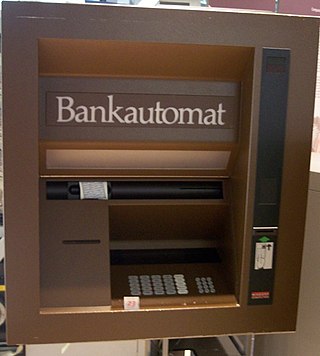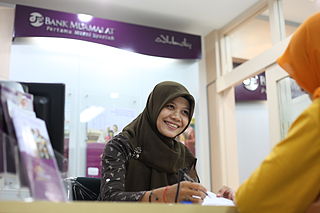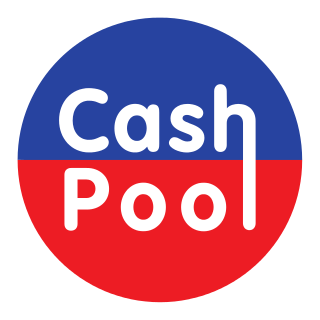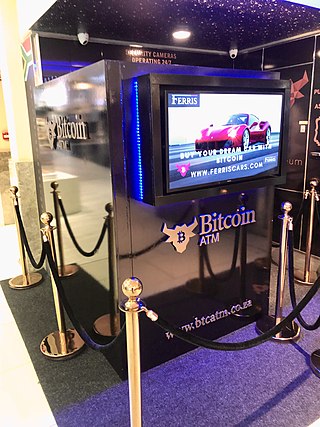Related Research Articles

A debit card, also known as a check card or bank card, is a payment card that can be used in place of cash to make purchases. The card usually consists of the bank's name, a card number, the cardholder's name, and an expiration date, on either the front or the back. Many new cards now have a chip on them, which allows people to use their card by touch (contactless), or by inserting the card and keying in a PIN as with swiping the magnetic stripe. Debit cards are similar to a credit card, but the money for the purchase must be in the cardholder's bank account at the time of the purchase and is immediately transferred directly from that account to the merchant's account to pay for the purchase.

An automated teller machine (ATM) is an electronic telecommunications device that enables customers of financial institutions to perform financial transactions, such as cash withdrawals, deposits, funds transfers, balance inquiries or account information inquiries, at any time and without the need for direct interaction with bank staff.
A personal identification number (PIN), PIN code, or sometimes redundantly a PIN number, is a numeric passcode used in the process of authenticating a user accessing a system.

A transaction account, also called a checking account, chequing account, current account, demand deposit account, or share account at credit unions, is a deposit account or bank account held at a bank or other financial institution. It is available to the account owner "on demand" and is available for frequent and immediate access by the account owner or to others as the account owner may direct. Access may be in a variety of ways, such as cash withdrawals, use of debit cards, cheques and electronic transfer. In economic terms, the funds held in a transaction account are regarded as liquid funds. In accounting terms, they are considered as cash.

The New York Currency Exchange (NYCE) is an interbank network connecting the ATMs of various financial institutions in the United States and Canada. NYCE also serves as an EFTPOS network for NYCE-linked ATM cards.
White-label automatic banking machines (ABMs) or White-label ATMs are ATMs that provide an alternative source of cash dispensing vis-à-vis traditional ATMs from banks. White-label ATMs (WLAs) may be operated by an independent ATM deployer.
An Integrated Access Device is a customer premises device that provides access to wide area networks and the Internet. Specifically, it aggregates multiple channels of information including voice and data across a single shared access link to a carrier or service provider PoP. The access link may be a T1 line, a DSL connection, a cable (CATV) network, a broadband wireless link, or a metro-Ethernet connection.

Payment cards are part of a payment system issued by financial institutions, such as a bank, to a customer that enables its owner to access the funds in the customer's designated bank accounts, or through a credit account and make payments by electronic transfer with a payment terminal and access automated teller machines (ATMs). Such cards are known by a variety of names, including bank cards, ATM cards, client cards, key cards or cash cards.

An ATM card is a dedicated payment card card issued by a financial institution which enables a customer to access their financial accounts via its and others' automated teller machines (ATMs) and, in some countries, to make approved point of purchase retail transactions. ATM cards are not credit cards or debit cards, however most credit and debit cards can also act as ATM cards and that is the most common way that banks issue cards since the 2010s.

The Malaysian Electronic Payment System (MEPS) is an interbank network service provider in Malaysia. In August 2017, MEPS merged with Malaysian Electronic Clearing Corporation Sdn Bhd (MyClear) to form Payments Network Malaysia Sdn Bhd (PayNet).

A bank teller is an employee of a bank whose responsibilities include the handling of customer cash and negotiable instruments. In some places, this employee is known as a cashier or customer representative. Tellers also deal with routine customer service at a branch.
ATM usage fees are the fees that many banks and interbank networks charge for the use of their automated teller machines (ATMs). In some cases, these fees are assessed solely for non-members of the bank; in other cases, they apply to all users. There is usually a higher fee for use of White-label ATMs rather than bank owned ATMs.

Multibanco is a Portuguese interbank network. It is the largest interbank network in Portugal owned and operated by SIBS , that links the ATMs of 27 banks in Portugal, totaling 12,700 machines as of December 2014. The bank members of Multibanco control the SIBS. Multibanco is a fully integrated interbank network. One of the most notable characteristics of Multibanco is the wide range of services that can be utilised through its machines.

A branch, banking center or financial center is a retail location where a bank, credit union, or other financial institution offers a wide array of face-to-face and automated services to its customers.

WSFS Financial Corporation is a financial services company. Its primary subsidiary, WSFS Bank, a federal savings bank, is the largest and longest-standing locally managed bank and trust company headquartered in Delaware and the Greater Delaware Valley. WSFS operates from 114 offices, 88 of which are banking offices, located in Pennsylvania (57), Delaware (39), New Jersey (14), Florida (2), Virginia (1) and Nevada (1) and provides comprehensive financial services including commercial banking, retail banking, cash management and trust and wealth management.

Cash Group is a cooperation of the four largest German private banks and their subsidiaries, in which they mutually waive ATM usage fees for their customers. It is not an interbank network but uses the pre-existing girocard network. With more than 7000 ATMs, the cooperating banks' ATM networks form the third largest ATM network in Germany.

CashPool is a cooperation of a multitude of smaller or virtual German private banks, in which they mutually waive ATM usage fees for their customers. It is not an interbank network but uses the pre-existing German ATM or Maestro/Cirrus networks. With more than 3200 ATMs, the cooperating banks' ATM networks form the smallest ATM group in Germany.

girocard is an interbank network and debit card service connecting virtually all automated teller machines (ATMs) and banks. It is based on standards and agreements developed by the German Banking Industry Committee.

A Bitcoin ATM is a kiosk that allows a person to purchase Bitcoin and other cryptocurrencies by using cash or debit card. Some Bitcoin ATMs offer bidirectional functionality, enabling both the purchase of Bitcoin and the sale of Bitcoin for cash. In some cases, Bitcoin ATM providers require users to have an existing account to transact on the machine.

The ATM Industry Association (ATMIA), originally the ATM Owners Association, was established in 1997 in the United States as a global nonprofit trade association to service an industry that built around the global growth of the ATM.
References
- ↑ "Glossary". Chip and PIN. Archived from the original on 2020-08-09. Retrieved 2016-08-17.
- ↑ Harper, Tom; Batiz-Lazo, Bernardo (2013). Cash Box: The Invention and Globalization of the ATM. Networld Media Group. ISBN 978-1935497622.